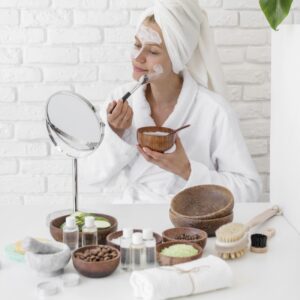Making your own skin care products is a unique and fun experience. Making cosmetics gives you the freedom to experiment, learn and create something that truly suits you. It is more than a hobby; it is a conscious way to connect with what you put on your skin. When you measure, melt and mix ingredients, you are not just combining ingredients; you are creating something with purpose and care. At home, every product you make, whether it’s a mild cleanser, a deep moisturizer or a bar of natural soap, reflects your personality and dedication. You decide what goes in and what stays out, and put together formulas that are both safe and sustainable. Through this hands-on approach, you learn to understand your skin’s needs better than any label.
In this guide, YouWish takes you through the basics of making cosmetics. You’ll learn how to choose the right ingredients, safely blend essential oils and balance texture with cetyl alcohol to achieve smooth, professional results. Whether you’re just starting out or want to refine your skills, these insights will help you create natural skin care products that are authentic, luxurious and all yours.
The joy of making natural skin care products
Making your own makeup is not only about using cleaner ingredients, but also about connecting with others. You connect with the materials, the process and yourself. Making cosmetics feels like a conscious and grounding process, from the gentle scent of lavender oil melting into a butter mixture to the way the mixture changes as you stir. Take a moment to slow down, pay attention to how things feel, smell and react, and truly appreciate the change taking place in your hands. This conscious process is like taking care of yourself, not just your skin, but your mind as well.
By making natural soap making and skin care products at home, you are also reducing waste and not using extra chemicals. It is a powerful feeling to know that with just a few simple ingredients and a clear process, you can make something luxurious, long-lasting and perfect for your skin. With each batch, the fun grows. As you become more confident, your workspace begins to feel like a little pharmacy, filled with natural scents, textures and creative ideas. And the best part? Every product you make tells a story, a story you’ve put attention, care and creativity into.
Choosing your ingredients
Every successful DIY skin care project starts with high-quality ingredients. The best thing about making cosmetics is that it is easy and flexible. You can start small, try different things and create products that are perfect for your skin type and preferences. When choosing ingredients, you also have to think about how they work together and how they fit together. Oils, butters, emulsifiers and essential oils all add something different to the formula. If you know what they do and how they work together, your products will be stable, safe and smell and feel great.
Base oils and butters
The main ingredients in all natural skin care products are base oils and butters. They provide shape, nourishment and long-lasting softness. Almond oil, jojoba oil and grapeseed oil are light and great for facial products. Coconut oil provides a thick lather when making natural soap.
Shea butter and cocoa butter are heavier butters that provide density and protection. They are super for dry skin or skin care in winter because they retain moisture and make skin feel better. You can find the right balance for yourself by mixing lighter and heavier ingredients. For example, you can use a silky lotion in the summer and a thick balm in the winter. Always use unrefined or cold-pressed oils when making
Emulsifiers and stabilizers
When you mix oil and water, they should remain stable. Your product will separate over time if you don’t use an emulsifier. Cetyl alcohol is one of the best stabilizers for making cosmetics.
Cetyl alcohol is not a drying alcohol, even if it sounds like it. It is a fatty, plant-based ingredient that makes products creamier and more consistent. It turns watery emulsions into smooth, professional-looking lotions and helps retain moisture without making skin greasy.
A small amount of cetyl alcohol (usually 2-5%) can make a big difference in how your product looks and feels. It prevents your lotion from flaking, makes it easier to spread and gives your creams that fine, soft feel you often get from store-bought creams.
Essential oils
Essentialoils are the finishing touch that bring your formula to life. They add fragrance, character and health benefits. Lavender soothes, peppermint wakes you up and rosemary cleanses your skin. Each drop enhances not only the scent, but the entire sensory experience of your product. When using essential oils, be careful not to use too much. Too much of them can be irritating because they are so concentrated. For skin care, 0.5 to 2% is usually safe. Never apply them directly to your skin. Always mix them with carrier oils or emulsions first.
Essential oils also allow you to express your own style when making cosmetics. You can create your own signature blends, such as a cheery morning lotion with lavender oil and orange oil or a calming night balm with cedarwood and vanilla oil.
Water and hydrosols
People often underestimate water and hydrosols, but they are very important for balancing formulas. Distilled water helps other ingredients absorb better and adds moisture. Hydrosols, such as rose, chamomile or lavender water, add a light fragrance and additional benefits.
These liquids are the foundation of your recipe when you make natural soap making or lotion. They will make your creations feel light and fresh and help spread the active ingredients evenly. By mixing them with cetyl alcohol and natural oils, you ensure that the result is smooth, stable and pleasant to the touch on the skin. By learning how each ingredient supports the others, you’ll understand the structure behind making great cosmetics and gain the confidence to experiment creatively.
Step by step: how to make natural cosmetics at home
The fun begins once you have all the ingredients. Making skin care products at home is both an art and a science. You have to pay close attention, but you can also have fun doing it. You will enjoy how the textures change, how the scents blend, and how good it feels to make something that is all your own.
Step 1: Plan your formula
Start with a goal. Choose what kind of product you want to make: a light face cream, a moisturizing balm or a cleansing soap. Make a list of your goals, the ingredients and the reason for each ingredient. For example, the type of oil you use to make natural soap affects the final texture. Coconut oil is good for cleansing, olive oil is good for smoothing and shea butter is good for moisturizing. Creating a plan for your recipe in advance will help you find the right balance between texture and action.
Step 2: Prepare and measure
Cosmetic making is all about precision. Instead of measuring out, use a digital scale to weigh each ingredient. Make sure all your tools, pots and spatulas are clean before you begin. Cleanliness makes things last longer and keeps you safe. Controlling the temperature is also part of preparation. Arrange your work area so that you can heat the oil and water phases separately. Keep a notebook handy; professional makers write down every test, every ratio and every observation.
Step 3: Heating and mixing
Put the oil phase (butters, waxes and cetyl alcohol) in a saucepan and heat gently. Heat the water phase separately. When both are about 70 °C, slowly pour the water into the oil phase while continuing to stir. This is the most important step in making cosmetics. Your creation will begin to take shape as you mix it, thickening, blending and turning into a cream. Stir slowly to get a smooth, even texture. The quality of this step affects how stable and refined your product feels.
Step 5: Storing and labeling
Put your product in clean bottles or jars. Put the product name, ingredients and date on each product. That way you can keep track of how fresh the produce is and keep track of how your recipes keep getting better.
Store your cosmetics make up in a cool, dark place. Most natural formulas stay good for a few months, especially those with cetyl alcohol, which helps maintain texture. Not only will you make natural cosmetics that look professional, but you can be proud that you made everything yourself.
Creative inspiration: turning simple ingredients into skincare rituals
One of the best things about making cosmetics is to see how a few natural ingredients can become an entire self-care routine.
You don’t always have to follow a strict recipe. Sometimes you just need to experiment, explore and watch the textures and scents change in your hands. Imagine spending a quiet afternoon making a small “skin care kit.” First, make a gentle scrub with sugar and almond oil to remove dead skin cells. Then make a soothing mist with rose hydrosol and a few drops of essential oil.
To get that rich, professional texture that YouWish customers love so much, add a little cetyl alcohol to your cream or balm base. Your daily skincare routine suddenly becomes something you really think about. You can even make natural soap as part of this ritual. Just add dried lavender or lemon peel to soap, pour it into molds and let it harden slowly as the scent of your creation fills your home. Each step takes you back to the simplicity of nature and shows that luxury comes not from the packaging, but from the effort and care you put into it.
Over time, you find your rhythm and learn which oils make your skin glow, which essential oils soothe your senses, and how to create textures that feel and work pleasantly. This is where true art and care come together, the point where making cosmetics is no longer a hobby, but becomes a craft.
Frequently Asked Questions
V1. Is cetyl alcohol safe for the skin?
Yes. Cetyl alcohol is a greasy, plant-based ingredient that softens and stabilizes products. It does not dry out or irritate the skin.
V2. How much essential oil should I use in cosmetics?
Generally, 0.5-2% of the total formula is sufficient. Always dilute essential oils well and avoid overuse.
V3. What is the best oil for beginners?
Sweet almond oil is an excellent choice for anyone just starting to make cosmetics. It is versatile, gentle and works in creams as well as soaps.
V4. Can I make natural soap with the same ingredients?
Yes! You can make natural soap with similar base oils such as coconut and olive oil. Just follow the proper saponification process and safety precautions.
V5. How can I make sure my products last longer?
Use clean tools, keep them out of the sun and add stabilizers such as cetyl alcohol to maintain consistency and extend shelf life.
Conclusion
Making natural cosmetics is a journey that combines art, care and knowledge. Over time, you will learn how to balance oils, butters and essential oils so that they all work together in a logical way. By making a small amount of lotion or trying natural soap making, you will learn more about how ingredients work and how good it feels to make something that is truly yours.
At YouWish, we believe that with the right help and good ingredients, anyone can have fun making cosmetics. Check out our range of natural base ingredients, butters and essential oils to get started on your next skincare project. Make things with care and purpose, and show your creativity in everything you make.

